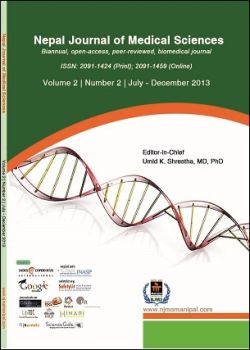Endoscopic versus conventional method for partial inferior turbinectomy in chronic hypertrophic rhinitis
DOI:
https://doi.org/10.3126/njms.v2i2.8945Keywords:
Endoscopic, partial inferior turbinectomy, rhinitis, SNOT-22Abstract
Background: The main goal of inferior turbinate surgery is to relieve obstruction while preserving the function of the turbinates as much as possible. Partial inferior turbinectomy (PIT) is an accepted and effective treatment in relieving the nasal obstruction while preserving the turbinate function. The use of endoscope provides complete visualization of the operating field and thus decreases the risk of excessive or inadequate resection.
Methods: A prospective single blinded randomized controlled trial was carried out in Department of ENT, Manipal Teaching Hospital, Pokhara, Nepal from September 2008 to March 2010 with an objective to compare between the conventional and endoscopic method of PIT in terms of outcome and post-operative morbidity in chronic hypertrophic rhinitis. Hundred cases were taken and assigned randomly into two groups; i.e. endoscopic PIT and conventional PIT. The post-operative findings were compared between the two groups using Fischer Exact test for proportion and t test for mean.
Results: There was 94% improvement in nasal obstruction in conventional group and 100% in endoscopic group at 1 month whereas improvement was 100% in both the groups at 3 months. Though no significant difference was seen statistically yet improvement was more in endoscopic group. There was significant difference in the SNOT 22 change score between endoscopic and conventional method at 1 month and 3 months. Significantly higher rates of post- operative morbidities were seen in case of conventional PIT at 1 month.
Conclusion: Endoscopic PIT is better than conventional in terms of improvement in nasal obstruction and decreased postoperative morbidity.
Nepal Journal of Medical Sciences | Volume 02 | Number 02 | July-December 2013 | Page 102-107
Downloads
Downloads
Published
How to Cite
Issue
Section
License
Copyright © by Nepal Journal of Medical Sciences. The ideas and opinions expressed by authors of articles summarized, quoted, or published in full text in this Journal represents only opinions of authors and do not necessarily reflect the official policy of Nepal Journal of Medical Sciences or the institute with which the author(s) is (are) affiliated, unless so specified.




